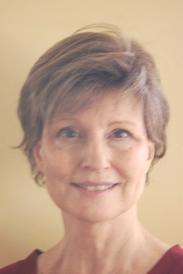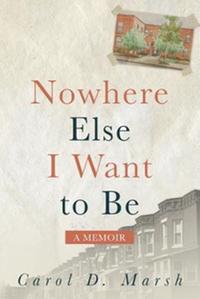 Carol D. Marsh is a writer, blogger, social justice advocate and founder of Miriam's House, a residential program for homeless women with AIDS. Marsh earned her MFA from the creative nonfiction program at Goucher College in 2014. In May 2016, her essay "Pictures in Leaves" was chosen for the 2016 New Millennium Writings Nonfiction Award. Nowhere Else I Want to Be: A Memoir (Inkshares) is her thesis and first published work. Our review is below.
Carol D. Marsh is a writer, blogger, social justice advocate and founder of Miriam's House, a residential program for homeless women with AIDS. Marsh earned her MFA from the creative nonfiction program at Goucher College in 2014. In May 2016, her essay "Pictures in Leaves" was chosen for the 2016 New Millennium Writings Nonfiction Award. Nowhere Else I Want to Be: A Memoir (Inkshares) is her thesis and first published work. Our review is below.
What made you decide to tell the story of Miriam's House in book form?
It wasn't a decision so much as a process. After I had to resign from Miriam's House (due to chronic migraine disease) at the end of 2009, I began writing about the women out of the grief of leaving a job I loved. It was both catharsis and an effort not to forget them. After several months, I had 30,000 words and began to think I might have a book. So I queried a few agents and found out that a loose grouping of stories doesn't make a book, at least not the way I'd done it. Around this time, I learned about low-residency writing programs, looked into them and decided the schedule--two weeks a year on campus, otherwise at home--fit the life I'd developed to manage my migraine pain. I was accepted into the MFA program in creative nonfiction at Goucher College. My thesis became this memoir.
You interweave the story of the women of Miriam's House with your own journey as a caregiver: exploring your own need to be liked and validated, while struggling to be truly present to the residents.
I went into my work at Miriam's House little knowing what a personal challenge it would be. I think I was prepared for the business aspect, and had a pretty good sense of what it would be like to live and work with women who were ill, but I was shocked at how much my own ego and neediness were tangled up into it all. I thought I'd worked through all that in a previous job (at Samaritan Inns, about which I write in the book).
I found out that if I wanted to be open, fair and compassionate in the work, which I truly did, I needed first to confront the things in me that were keeping me from being that way: the neediness, judgment, assumptions and bias. So an interweaving of the stories of the women with my own journey was the only way to write the memoir with integrity. It's the inward glance at myself, my motives and needs, juxtaposed with my relationship with the women. And I think that also ended up being the best way to show how much I learned from them. The stories in the book are only a handful of those that happened at Miriam's House during your time there. How did you decide which and whose stories to share?
The stories in the book are only a handful of those that happened at Miriam's House during your time there. How did you decide which and whose stories to share?
At first, I simply wrote what I remembered most vividly. I took those stories to Goucher and was taught how to write a book: structure, narrative arc, character, etc. As the initial 30,000 words expanded to more than 90,000, I was also developing the book's themes, so I chose stories that illustrated my themes: transformation, the overarching theme of the book; social justice, which I think may be the most relevant theme for today; addictions and recovery, my own as well as the residents'; and death and dying.
Then there's the consideration of balance. I didn't want the book to be story after story about dying, or to pretend the experience was one happy party. I chose a few deaths that had the most impact on me. Muriel's death was at the top of that list, because of the spirituality of it.
Also, I didn't want it to be romanticized or sentimental. For the sake of honesty, I had to write about all the mistakes I made, but I also wanted to show how gloriously human the women were.
The other big balance decision was about the number of characters. Over the years I worked there, we were a home for more than 150 women and 30 children and we employed more than 40 people. I ended up focusing the narrative on a couple of long-term residents like Kimberly and long-term staff like Faye, with a sprinkling of other residents and staff important for certain stories or themes.
What did you find challenging and/or surprising about the process of writing the book?
When I first started the MFA program, it surprised me that my mentors and classmates wanted me to write in depth about how and why I started Miriam's House. I'd been focusing on the stories of the women, which were most interesting to me, and they liked those, but they wanted more about me than I was then prepared to give. But in the end, that gave me a better platform from which to engage the major theme of the book--transformation--and the most prominent sub-theme, social justice. It also made for a more well-rounded and more honest memoir.
Inkshares is a "crowd-driven" publisher; can you talk about your decision to go that route?
Two reasons for the decision to go with Inkshares, a decision I'm very happy I made. The first was that I got impatient with the process of finding an agent. I'd done everything I was told to do--like have a website, get excerpts published and learn how to write a good query--yet it felt like it was happening on glacial time.
In the past, I'd started Miriam's House and worked hard to make it a viable business. Sitting back and waiting for someone to pick up the book felt so passive--exactly the opposite of my spirit and energy at Miriam's House. So I investigated self-publishing, but had to rule that out because of my constant migraines, which wouldn't allow me the amount of work and promotion required to promote a self-published book.
Around this time, a fellow graduate of the Goucher program told me about publishing her book through Inkshares. I looked at it and liked that they bring the author into all aspects of publication, and pay 35% of net sales. It was a way to be proactive in my publishing effort and also dredge up business skills unused since I'd left Miriam's House.
I took over the business of getting my book published. Though it felt great, it wasn't easy, as there were plenty of days when I just wanted to retreat to a dark room with my painful head, but instead had to spend a couple of hours on the phone or the computer. But it was well worth it. I'm proud of this book in a way I might not be had it been published in a more traditional way. --Katie Noah Gibson, blogger at Cakes, Tea and Dreams

